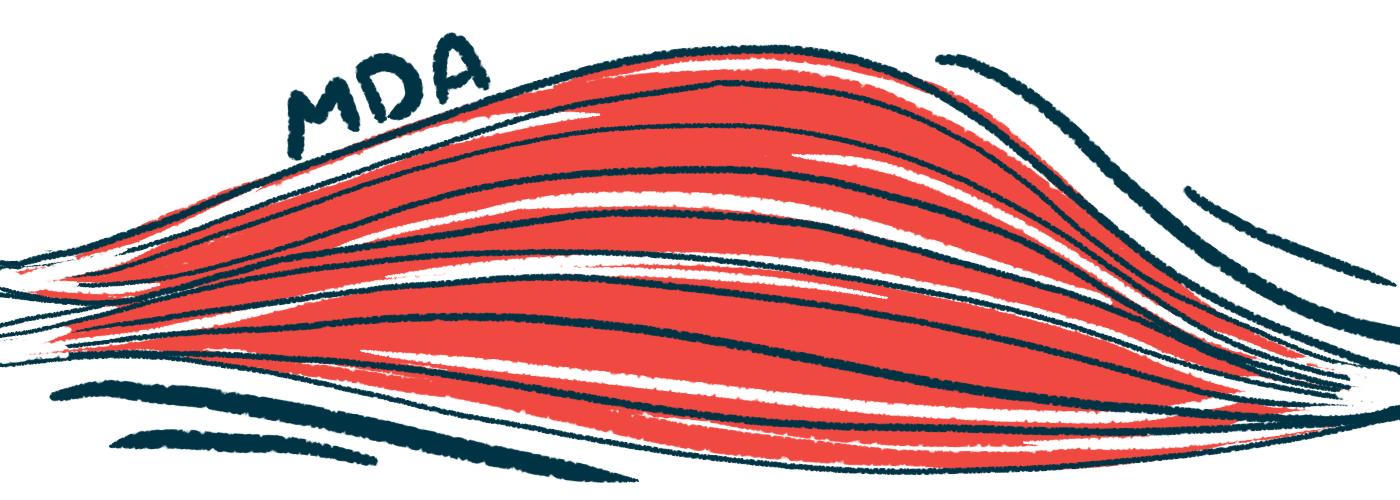MDA 2024: Myotonic dystrophy type 1 reverses with AOC 1001
Now del-desiran, 1-year treatment eased myotonia, improved muscle strength
Written by |

Long-term treatment with AOC 1001 continues to be safe and may reverse the progression of myotonic dystrophy type 1 (DM1), according to new data.
A year of treatment eased myotonia, that is, the inability of muscle to relax after they’ve contracted, and improved muscle strength along with outcomes of activities of daily living, such as taking a shower, climbing stairs, or visiting family or friends.
The therapy’s developer Avidity Biosciences has announced that delpacibart etedesiran (del-desiran) is the international nonproprietary name of AOC 1001.
Data from MARINA-OLE (NCT05479981) are being presented this week at the 2024 Muscular Dystrophy Association (MDA) Clinical & Scientific Conference, in Orlando and virtually. The poster is titled “Initial Results of the Phase 2 Open-Label Extension Study of AOC 1001 in Adults With Myotonic Dystrophy Type 1: MARINA-OLE.”
“The favorable long-term safety data and consistent, durable improvement in myotonia, muscle strength and patient-reported outcomes measures show the potential of del-desiran to make a meaningful difference in the lives of DM1 patients,” said John W. Day, MD, PhD, the director of the division of neuromuscular medicine at Stanford University School of Medicine, and an investigator in the MARINA trials, in a company press release.
DM1 is caused by mutations in the DMPK gene, which lead to an abnormally long messenger RNA (mRNA) that forms toxic clumps in muscle cells. mRNA is a temporary molecule cells use to produce proteins. The disease is marked by myotonia and progressive muscle weakness, causing difficulties speaking, swallowing, and breathing, as well as immobility.
Results of AOC 1001 in DM1
AOC 1001, which is administered via an infusion into the bloodstream, decreases toxic mRNA levels by having a siRNA — a specialized RNA molecule — target mRNA for destruction. The siRNA is attached to the transferrin receptor 1 to lower levels of DMPK RNA in skeletal, cardiac, and smooth muscle.
Topline results from the Phase 1/2 MARINA trial (NCT05027269) showed AOC 1001 had a favorable safety profile with mild or moderate side effects. It was successfully delivered to muscle cells where it reduced DMPK activity and was suggested to ease myotonia and improve functional measures.
The 37 patients who completed the trial chose to continue in the MARINA-OLE study, where they’re all receiving the treatment every three months for two years.
Results presented at the MDA conference support AOC 1001’s favorable long-term safety and tolerability, with nausea and headache as the most common treatment-related side effects. No serious side effects related to treatment were reported.
Regarding its effectiveness, the 4 mg/kg dose showed sustained improvements in several measures of muscle strength, including hand grip and the quantitative muscle testing total score, a reflection of hand grip, elbow and knee extension and flexion, and ankle dorsiflexion, that is, moving the foot so the toes point toward the knee. AOC 1001 also eased myotonia, as assessed by the video hand opening time, or vHOT.
The results from END-DM1, a natural history study on the progression of myotonic dystrophy to determine biomarkers and outcome measures, found reversal of DM1 disease progression with AOC 1001 after a one-year comparison of MARINA-OLE data with a matched study population. The benefits were seen in myotonia, muscle strength and patient-reported activities of daily living.
Muscle strength, vHOT, and activities of daily living will also be outcome measures in HARBOR, a global Phase 3 trial expected to enroll 150 patients at about 40 sites. Enrollment should start soon, following regulatory agreement on its design.
“We are pleased that the agreed-upon functional endpoints in the Phase 3 HARBOR study are the same endpoints in which del-desiran has demonstrated consistent and durable improvements in the MARINA studies,” said Sarah Boyce, Avidity’s president and CEO.
In the study, DM1 patients will be randomly assigned to either AOC 1001 at 4mg/kg every eight weeks or a placebo, for nearly a year. After the trial finishes, participants may advance to an open-label extension study.
“Thank you to the DM1 community, in particular, the participants, their families, the investigators and their teams, for their support, dedication, and commitment to the MARINA program. The depth and breadth of del-desiran data that we have gathered from these studies offer hope for people living with DM1,” Boyce said.






